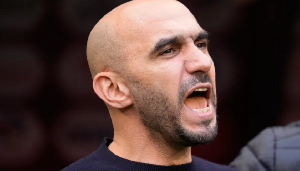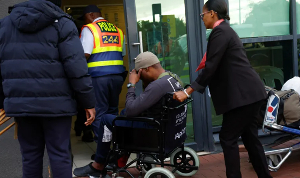By Michael J.K. Bokor, Ph.D.
E-mail: mjbokor@ilstu.edu
The return to power of the NDC continues to raise several issues that excite my interest and curiosity. The latest issue concerns the fate of Dr. Mahamudu Bawumiah, Deputy Governor of the Bank of Ghana, and the Running Mate of the NPP’s Akufo-Addo in the December 2008 general elections. A needless controversy surrounding Bawumiah’s return to post after the defeat of the NPP has cropped up in the public domain. There is news that the NDC government has initiated moves for Bawumiah to resign honourably or be removed from post.
This move has attracted public interest. A sharp reaction has already come from a management consultant, Ato Conduah, who says that any attempt to force Dr. Bawumiah out of office will be in contravention of the Labour Laws. One suggestion he offers to solve the problem is that Dr. Bawumiah be bought out of the remainder of his contract as is done in all respectable democracies. According to him, labour laws in Ghana have clear procedures in severing contracts with public and civil servants. Then, he drops the bombshell that Dr. Bawumiah could seek remedies for unlawful dismissal.
I have chosen to wade into this matter by disagreeing completely with Ato Conduah and anybody who thinks like him on this issue. I premise my stance on this question: Are we in Ghana principled at all?
Although I don’t know the exact terms of Bawumiah’s contract with the Bank of Ghana, I am tempted to assume that they do not include participation in partisan political activities to the extent of attempting to become the Vice President of Ghana, losing the bid, and returning to work as if nothing happened at all to change the dynamics of the work place situation within the context of the management of the national economy.
Again, I don’t think that Bawumiah’s contract with the Bank of Ghana (a sensitive public sector institution) provides for what he did---leaving his employment to participate in partisan politics and returning to post to work with members of a government whom he had spent time and energy condemning, prior to the elections, as lacking the acumen with which to run the affairs of state. In other words, Bawumiah did not consider President Mills and the NDC as capable of doing better than the NPP on whose ticket he was running to become the Vice President.
Furthermore, like any worker in the public sector, who draws his salary from the Consolidated Fund, he would be expected to resign from his position if he wanted to involve himself in partisan politics. Did he do that? Or did his contract not say anything about how he should spend time and energy within the period that the contract lasts? What at all is this contract about? I recall the recent case of Alhaji M.N.D. Jawula who had to resign his Chief Director’s post at the Ministry of Health to join the NPP’s bandwaggon. He didn’t return to post when he failed his bid because the country’s Labour Laws frowned on that practice. Again, some chiefs who chose to participate in partisan politics abdicated their stools because of constitutional requirements. For instance, both Dr. Hilla Liman and Kow Nkensen Arkaah did so. As to whether their communities would agree to restore them to their former status as chiefs is a matter for them to contemplate and act on. In the case of Bawumiah, he neither resigned his position nor did he work for the Bank of Ghana within the period that he was going round the country looking for votes for the NPP.
Was he paid for not doing what he was contracted to do as a politician? If yes, then he should pay back that unearned emolument. He did not work for it; and I see it as “extortion” of money from the state.
Again, at the level of morality and good conscience, Bawumia should know that having identified himself with the NPP, and having participated actively in its campaign of vilification against President Mills (as an individual) and the NDC (as a party now in government), his presence at the Bank of Ghana will not be countenanced. What more does he need to be told before he does the honourable thing?
As the Deputy Governor of the Bank of Ghana, I presume that he is an automatic member of the government’s Economic Management Team. The paradox comes up: How will he now collaborate with the very people that he had toured the country condemning for being “unfit” to rule Ghana? Again, how does he expect to be related to? Does he not know that he has already caused credibility problems, and eroded personal confidence in himself? How does he expect the NDC government to trust him with sensitive information regarding the management of the economy?
The questions are many. How does he expect the NDC government to engage him on sensitive economic policy issues without any fear of his leaking the secrets to the NPP, particularly? Indeed, Bawumiah’s case reminds me of what generated the conflict between former President Rawlings and the late Vice President Arkaah, which culminated in the unfortunate physical assault on him by Rawlings at the Cabinet meeting at the Osu Castle in December 1995. The former President’s complaint was that his Vice was in cahoots with the political opponents of the NDC government and was ferrying secrets from the corridors of power to them. Indeed, it is understandable that having a mole of that sort in government is unacceptable, especially if he is known and does his “spying business” with impunity. The best thing to do is to get rid of him.
In the case of Bawumiah, one expects him to do the honourable thing being suggested to him now: to resign or be removed from post. There should be no room for buying him out of the contract. He has chosen to abrogate it. If anything at all, the action to remove him from post can be justified to any extent imaginable. If he chooses to go to court, let’s allow the Judiciary to determine the case. After all, the Judiciary is an integral part of the structural arrangements that should nurture our democracy into a long-lasting workable phenomenon. But we need to remember that democracy itself thrives on principles and respect for orderliness.
Talking about the country’s Labour Laws or recourse to the courts won’t frighten anybody. I don’t consider this development as a test case at all. It falls far below the level of a test case because of its foregone conclusion that Bawumiah gambled with his employment right from the scratch and lost. He has to leave the Bank of Ghana without seeking to hide behind the so-called Labour Laws of the country.
It is a simple case of being politely asked to do the right thing and to save us all from wasting time and energy going through any legal motion just for its own sake. In the end, I am optimistic that Bawumiah will not succeed in achieving anything noteworthy for himself or the country even if he chooses the legal route. He has to do the right thing now and preserve the little honour he has for a future aspiration, whatever it may be.
If he decides to pursue his political ambitions in future, he will need the result of what he does in this case as a platform on which to stand tomorrow to seek public goodwill. Anything short of this line of action will cause his premature political doom. There are many avenues to look for if he still wants to be productive. By his own miscalculation, he has succeeded in banging tight the doors of the Bank of Ghana on his face; thus, shutting himself out of the equation. He has no case to fight.
Professionally, he has dissipated whatever instincts he might have for wanting to remain in the position of a Deputy Governor of the Bank of Ghana. By openly involving himself in partisan politics, he has already drawn the line and must keep to it. He has already reached the banks of the Rubicon and must cross over to the other side at his own volition or be pushed out there. He has no other option; he has already gone a long way out of that sector, and there is no turning back for him now.
One lesson that Bawumiah’s case must teach us is that those who aspire to become politicians must ensure that they know how to tackle issues in terms of the source of their livelihood. If a public sector worker goes to the extent that Bawumiah has taken his ambitions, the upshot will be unpleasant, especially if those political ambitions end up in smoke. Those who seek political office must ensure that they are not pushed into the corner in terms of job security. He chose the wrong bullet to bite and must now face the consequences stoically. He may toy with the idea of seeking redress in court. As the saying goes, “The way is his front”; but I wonder how he will fight that case. It is a matter of principles. If you choose to walk on a stony path without shoes, be prepared to endure the pain.
I think that Bawumia doesn’t have any moral justification to want to stick to the so-called contract that he has with the Bank of Ghana to allow him remain at post till it expires in 2010. Does the contract not have anything to control behavior? Or is it a sweeping one that gives him so much elbow room as to do what he has done and then turn round to work with the very political camp that he expended energy and resources disgracing to the whole world? I think that the clock has ticked well and loud enough for Bawumiah to hear and obey. It’s time to go.














